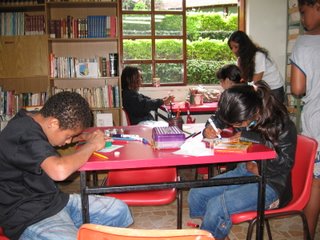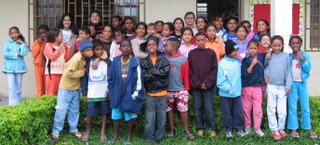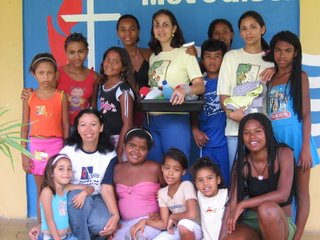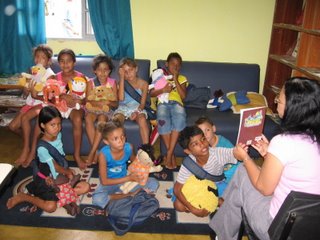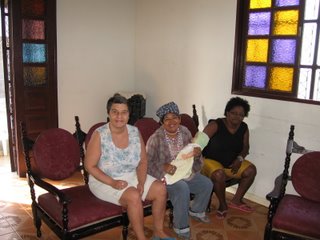Stuck in the middle
I've noticed it's even more difficult to finish things here in Brazil than in the U.S. And that can range from a conversation (being interrupted is quite common) to a project. I've always enjoyed telling long, drawn-out stories (that prompt the listeners to prod me to the conclusion after I've branched out on several tangents). Here I have to radically condense what I want to say into a soundbite that will fit into the brief uninterrupted space I can grab in a conversation. Finishing things has never been my strong suit, so it's even more of a challenge now. I haven't gotten too terribly Brazilian in my work schedule yet; the typical schedule here seems to include a mid-morning coffee break, lunch, a brief rest after lunch and a mid-afternoon coffee break. When I was trying to get something done last Friday afternoon, I had to joke with my colleagues to explain that I wanted to accomplish something on Friday afternoon because of my American work habits.
I'm still in the "initial" phases of looking for a new place to live. "Initial" meaning I haven't actually seen any places, but I need to try to move next month. I was surprised to see how few places are listed for rent compared to for sale in the newspapers here. I have yet to officially consult a local real estate person.
Here in Brazil, it's easier for me to avoid the holiday craziness because it doesn't "feel" like Christmas to me. I don't usually do much shopping here, so I haven't been too exposed to gaudy store displays and muzak Christmas carols. Also, in my mind, Christmas has always been cold, so when it's 80-90 degrees, it doesn't feel like Christmas. Just like last year, the fake Christmas tree got assembled in our apartment in mid-November. I do notice the sales advertisements (you can pay over 12 months with no interest, etc.) and people on the buses with large packages. When I was living in the U.S., my family had already started to draw names so you just buy presents (under a certain limit) for that one person, and we might be switching over to just buy them for the kids. Now because I have the excuses that, a) I'm poor and b) I'm not going back to the U.S. for Christmas this year and shipping would be prohibitively expensive, I haven't done any Christmas shopping at all. Here's the graphic I put together with pictures from the kids in the various Shade and Fresh Water projects that I've visited.
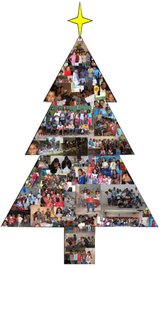
This past weekend, I helped with the women's Walk to Emmaus retreat that was held at the São Gabriel community center Thursday evening through Sunday afternoon. A lot of the components were familiar to me from having experienced the retreat last year in North Carolina, but other elements (particularly in the planning) were radically different. I know that in the U.S., the details are often planned way in advance, but here, we were still moving beds into rooms at 7:30 when the participants were scheduled to arrive at 8:00. The no-show rate seemed pretty high to me (9 out of 25) but the team members said that was about normal. A lot of the small things that are usually prepared in advance and donated by other groups were prepared on site during the retreat. I think these differences can be attributed to both a) a more spontaneous culture and b) a smaller Emmaus network to work with. It still seemed to be a powerful experience for the participants, and I was glad to work with the team members from various Methodist churches around the city.
I've met a few foreigners here in Belo Horizonte through the Internet, and we're trying to organize a monthly social event for foreigners here since there doesn't seem to be any established network. The other large cities in Brazil, São Paulo and Rio de Janeiro, have well-organized networks of expatriates. But now it looks like at least two of us may be too busy to attend.
Finally, when I happened to watch TV last week, I saw a movie for the Consciousness of the Black Race Day called Uma Onda no Ar. In English, it literally means "A Wave on the Air," but the English title of the movie is "Something in the Air." It was based on the true story of Rádio Favela, which started as a pirate radio station in a slum and eventually became a legal community radio station. This was particularly interesting to me because I used to be a volunteer DJ in Durham, North Carolina, and it turns out this radio station is here in Belo Horizonte. Also, I was excited to see on their web site that they have information on their web site about a program called "Ciência na Favela" or "Science in the Slum." I hope to be able to visit the station and find out more, especially about the science program, to know if we can reproduce it at the Shade and Fresh Water projects.
I'm still in the "initial" phases of looking for a new place to live. "Initial" meaning I haven't actually seen any places, but I need to try to move next month. I was surprised to see how few places are listed for rent compared to for sale in the newspapers here. I have yet to officially consult a local real estate person.
Here in Brazil, it's easier for me to avoid the holiday craziness because it doesn't "feel" like Christmas to me. I don't usually do much shopping here, so I haven't been too exposed to gaudy store displays and muzak Christmas carols. Also, in my mind, Christmas has always been cold, so when it's 80-90 degrees, it doesn't feel like Christmas. Just like last year, the fake Christmas tree got assembled in our apartment in mid-November. I do notice the sales advertisements (you can pay over 12 months with no interest, etc.) and people on the buses with large packages. When I was living in the U.S., my family had already started to draw names so you just buy presents (under a certain limit) for that one person, and we might be switching over to just buy them for the kids. Now because I have the excuses that, a) I'm poor and b) I'm not going back to the U.S. for Christmas this year and shipping would be prohibitively expensive, I haven't done any Christmas shopping at all. Here's the graphic I put together with pictures from the kids in the various Shade and Fresh Water projects that I've visited.

This past weekend, I helped with the women's Walk to Emmaus retreat that was held at the São Gabriel community center Thursday evening through Sunday afternoon. A lot of the components were familiar to me from having experienced the retreat last year in North Carolina, but other elements (particularly in the planning) were radically different. I know that in the U.S., the details are often planned way in advance, but here, we were still moving beds into rooms at 7:30 when the participants were scheduled to arrive at 8:00. The no-show rate seemed pretty high to me (9 out of 25) but the team members said that was about normal. A lot of the small things that are usually prepared in advance and donated by other groups were prepared on site during the retreat. I think these differences can be attributed to both a) a more spontaneous culture and b) a smaller Emmaus network to work with. It still seemed to be a powerful experience for the participants, and I was glad to work with the team members from various Methodist churches around the city.
I've met a few foreigners here in Belo Horizonte through the Internet, and we're trying to organize a monthly social event for foreigners here since there doesn't seem to be any established network. The other large cities in Brazil, São Paulo and Rio de Janeiro, have well-organized networks of expatriates. But now it looks like at least two of us may be too busy to attend.
Finally, when I happened to watch TV last week, I saw a movie for the Consciousness of the Black Race Day called Uma Onda no Ar. In English, it literally means "A Wave on the Air," but the English title of the movie is "Something in the Air." It was based on the true story of Rádio Favela, which started as a pirate radio station in a slum and eventually became a legal community radio station. This was particularly interesting to me because I used to be a volunteer DJ in Durham, North Carolina, and it turns out this radio station is here in Belo Horizonte. Also, I was excited to see on their web site that they have information on their web site about a program called "Ciência na Favela" or "Science in the Slum." I hope to be able to visit the station and find out more, especially about the science program, to know if we can reproduce it at the Shade and Fresh Water projects.
